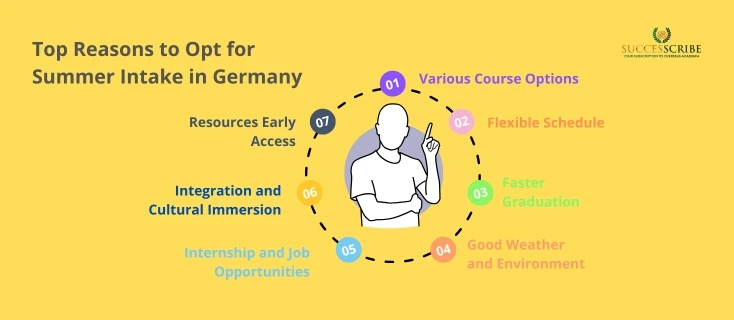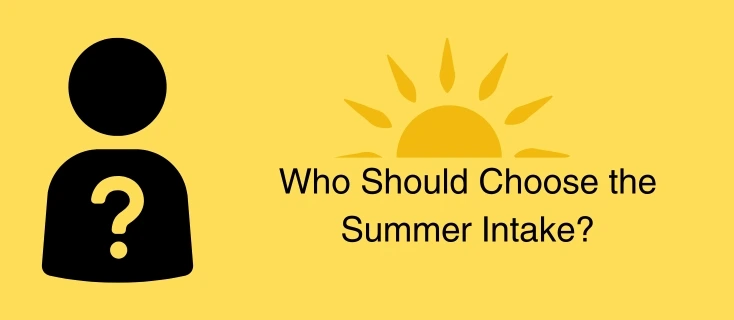If you are planning to study in Germany but miss the winter deadline, don’t worry! The Summer Intake is a great option that allows you to start university in March or April without waiting another year. Just make sure to check if your preferred course is available and start preparing your documents early to meet the deadlines. In this topic, you’ll get to know all about the Summer Intake in Germany, from dates, criteria, planning to timeline everything.
Important Dates of Summer Intake in Germany
Understanding the timeline is crucial for a successful application.
Please note that Specific dates may vary depending on the university and program. It’s essential to consult the official websites of the universities for precise deadlines:
Below is a general overview of the key dates for the summer intake in Germany for 2025, categorized for both public and private universities:
Public Universities (Strict Deadlines)
| Event | Timeframe |
| Semester Start | March – April |
| Application Period | November – January |
| Application Deadline | Mid-January 2025 |
| Admission Decision Notification | February – March 2025 |
| Visa Application Process | March – April 2025 |
| Semester Commencement | March – April 2026 |
Private Universities (Extended Deadlines)
Private universities in Germany typically have rolling admissions and longer deadlines to accommodate more students. Their timeline is as follows:
| Event | Timeframe |
| Semester Start | March – April |
| Application Period | October – February 2025 |
| Application Deadline | Late February – March 2025 |
| Admission Decision Notification | February – April 2025 |
| Visa Application Process | March-May 2025 |
| Semester Commencement | April – May 2026 |
Points to Remember Regarding Public and Private Universities’ Summer Intake
- Public universities have fixed deadlines and strict application windows (mostly ending in January).
- Private universities offer more flexibility with extended deadlines and a longer enrollment period (some allow applications until March/April).
- Private institutions often provide faster admission decisions, making them a good alternative for students who miss public university deadlines.
Overview of Summer Intake in Germany in Simple Words?
The Summer Intake is a term used to describe university admissions that start in March or April instead of September or October (which is the Winter Intake). It is less competitive than the Winter Intake because fewer students apply during this period, meaning there are more chances of getting admission.
When you want to study in Germany, you have two main intakes to choose from Winter Intake (the main intake) and Summer Intake (the secondary intake). The Summer Intake in Germany starts around March or April every year and is a great option for students who miss the winter deadlines or prefer to start their studies earlier in the year. This intake is perfect for students who missed the winter application deadlines or prefer to begin their studies in the middle of the year.
Overview of Intakes in Germany
Unlike many other countries, Germany has two major admission intakes:
| Intake | Application Period | Semester Start | Number of Programs Available | Competition Level |
| Winter Intake | December – July | October | 80% of all courses available | High |
| Summer Intake | August – January | April | 20% of all courses available | Moderate |
For students planning to join in 2025, the summer intake offers a chance to begin their studies in a fresh and vibrant season. Many universities in Germany open their doors for both bachelor’s and master’s programs during this time. While the winter intake is more common and has a wider variety of programs, the summer intake is still a popular choice, especially for certain specialized courses.
Eligibility Criteria for Summer Intake in Germany
The basic eligibility criteria for applying to German universities in the summer 2025 are:
| Requirement | Details |
| Academic Qualification | Bachelor’s degree (for master’s) or 12th grade (for bachelor’s) with a minimum GPA of 2.5-3.0 (equivalent to 60-75% in Indian grading) |
| Language Proficiency | IELTS (minimum 6.5), TOEFL (minimum 90), TestDaF (minimum TDN 4 in each section) |
| APS Certificate (For Indian students) | Mandatory for all applications from India |
| Work Experience (for MBA/Business Programs) | Minimum 1-2 years (depends on university) |
Top Universities and Programs for Summer Intake 2025
Although fewer programs are available, many top German universities offer courses in the summer semester. Below is a list of universities and their popular programs:
| University | Popular Programs | Application Deadline |
| Technical University of Munich (TUM) | M.Sc. in Automotive Engineering, B.Sc. in Aerospace Engineering | Jan 31, 2025 |
| RWTH Aachen University | M.Sc. in Data Science, M.Sc. in Business Administration | Jan 15, 2025 |
| Ludwig Maximilian University (LMU) | M.Sc. in Data Science, MBA, B.Sc. in Biochemistry | Jan 15, 2025 |
| University of Hamburg | M.A. in International Criminology, B.Sc. in Oceanography | Jan 15, 2025 |
| Technical University of Berlin | M.Sc. in Space Engineering, MBA in Energy Management | Dec 1, 2025 |
| Karlsruhe Institute of Technology (KIT) | M.Sc. in Electrical Engineering, B.Sc. in Business Informatics | Jan 15, 2025 |
Top Reasons to Opt for Summer Intake in Germany

- Various Course Options: The summer intake offers a wide range of courses, allowing students to explore new academic interests.
- Flexible Schedule Summer intake provides more flexibility in course scheduling, enabling students to complete their studies in a shorter duration.
- Faster Graduation: Starting studies in the summer can lead to earlier graduation, saving time and reducing overall educational expenses.
- Good Weather and Environment: Germany’s pleasant summer weather provides an ideal setting for outdoor activities and cultural exploration.
- Internship and Job Opportunities: The summer intake aligns with peak hiring seasons, offering increased opportunities for internships and part-time jobs.
- Integration and Cultural Immersion: Starting studies in the summer allows students to adjust to their new environment and immerse themselves in German culture.
- Resources Early Access: Summer intake students may benefit from early access to university resources, such as academic advising and library facilities.
Top Reasons Why Not to Opt for Summer Intake in Germany
Here are some disadvantages of summer intake in Germany, they are:
- Limited Course Availability: Not all programs are available during the summer intake, potentially restricting options.
- Housing Challenges: Securing accommodation might be more competitive due to limited availability.
- Adjustment Period: Starting in the summer may mean fewer orientation programs, requiring students to adapt more independently
Popular Courses in Summer Intake 2025
The summer intake in Germany offers a diverse range of courses at both the undergraduate and postgraduate levels. Some of the popular programs include:
- Creative Computing
- Data Science
- Finance & Management
- Engineering
- Natural Sciences
- BBA (Bachelor of Business Administration)
- MBA (Master of Business Administration)
Documents Required for Summer Intake in Germany
Applying for the summer intake necessitates a comprehensive set of documents. Commonly required items include:
- Academic records (originals or scans of your 10th and 12th-grade certificates and bachelor’s transcripts, if applicable)
- Degree certificate from previous studies
- Two letters of recommendation (LORs)
- APS Certificate
- GRE/GMAT scores (if applying to a public university)
- Proof of English language proficiency (IELTS/TOEFL/MOI/Duolingo)
- Passport-sized photos
- Any other certificates or awards you’ve received
- A statement of purpose explaining why you want to study in Germany
- Valid passport
- CV/Resume
Is the Summer Intake Right for You?
If you’re someone who likes to take advantage of opportunities and doesn’t mind a slightly faster pace, the summer intake could be perfect for you. It’s also a good choice if you’re looking for a less crowded campus and more personalized attention from professors.
Key Facts and Data About Summer Intake in Germany
| Category | Details |
| Summer Intake Start Date | April 1, 2025 |
| International Students | Over 350,000 international students study in Germany, with 20-25% joining in the summer intake. |
| Application Deadline | January 15, 2025 (varies by university) |
| Program Availability | Master’s Programs: 60%Bachelor’s Programs: 30-40% |
| Universities Offering | 250+ universities |
| Popular Fields of Study | – Engineering: 35%– Computer Science: 25%– Business Administration: 15%– Natural Sciences: 10%– Social Sciences & Humanities: 15% |
| Percentage of Universities Offering Summer Intake | 30–40% of German universities |
| English-Taught Programs | Over 220 programs available (primarily at the Master’s level) |
| Scholarships | Scholarships are available, but competition is high, with only 15-20% of scholarships allocated for summer intake students. |
| Graduation Rate | Graduation rates are high (85-90%), and over 60% of students find jobs within a year of graduation. |
Timeline for Summer Intake in Germany (2025) Step-by-Step Guide
If you are planning to apply for the Germany Summer Intake 2025, it’s important to understand that the admission process takes time. The timeline below provides a general framework, but certain steps—like IELTS preparation, university shortlisting, and visa application—should start much earlier.
The process can be overwhelming, but using expert guidance from Successcribe Consultancy can help streamline your application, ensure you meet deadlines, and improve your chances of getting into top universities in Germany.
| Phase | Timeline | Key Actions |
| 1. Research & Shortlist Universities | August – October 2025 (Start earlier!) | Identify top universities and programs accepting applications for Summer Intake 2025Check eligibility criteria, language requirements, and tuition feesResearch scholarship opportunities for international studentsStart this step much earlier (even 6–12 months before applying) to avoid last-minute confusion. Successcribe Consultancy can help you shortlist the best universities based on your profile! |
| 2. Prepare Required Documents | September – November 2025 | Gather academic transcripts, degree certificates, and mark sheetsTake English or German language tests (IELTS, TOEFL, TestDaF, DSH)Prepare your Statement of Purpose (SOP) and Letters of Recommendation (LORs)Get an APS Certificate (mandatory for Indian students)IELTS/TOEFL prep takes time! Start at least 3 months in advance. Successcribe can help with SOPs & LORs. |
| 3. Start Applications | November | Submit applications via Uni-Assist or university portalsPay application fees and track your application statusApply as early as possible to avoid last-minute delays |
| 4. Application Deadline | Mid-January | Most public universities close applications by January 15, 2025Many private universities have extended deadlines until March 2025 |
| 5. Receive Admission Offers | February – April 2026 | Universities begin sending admission lettersRespond to offers and confirm your seat by paying the necessary fees (if applicable) |
| 6. Apply for Visa & Arrange Finances | March 2026 | Open a Blocked Account with at least €11,208 (approx. ₹9.6 lakhs)Get health insurance and find student accommodationApply for a German Student Visa at the nearest German Embassy or ConsulateVisa processing takes 4–12 weeks, so apply early! |
| 7. Plan Your Travel & Accommodation | April 2026 | Book flight tickets to Germany Arrange student housing or dormitories. |
| 8. Semester Begins | April 2026 | Attend university orientation programsRegister for courses and get your student IDSet up a bank account and register your residence with local authorities. |
Applying for German universities can be challenging and time-consuming. Successcribe Study abroad Experts helps students with shortlisting universities, SOP writing, visa guidance, and overall application supportmaking your study abroad journey easy and stress-free.
Who Should Choose the Summer Intake?

The Summer Intake in Germany is a great option for many types of students. Here’s a detailed breakdown of who can benefit from applying in this intake:
- Students Who Missed the Winter Intake Deadline
If you couldn’t complete your application on time for the Winter Intake, you don’t have to wait for an entire year. The Summer Intake lets you start earlier.
- Students Who Want to Start Studying Faster
If you don’t want to waste time and prefer to start your studies as soon as possible, March/April intake is the best option.
- Applicants Who Need Extra Time for Visa Processing or Documentation
Some students may need more time to prepare their documents, finances, and visa applications. Since fewer students apply, visa processing can sometimes be faster than during the Winter Intake.
- Those Who Prefer Smaller Class Sizes
Since fewer students apply for the Summer Intake, class sizes tend to be smaller, meaning more personalized attention from professors and better interaction in lectures.
- Students Looking for Better Admission Chances
As fewer people apply in the Summer Intake, the competition is lower compared to Winter Intake, increasing your chances of getting admission to top universities.
- Students Who Prefer Warmer Weather
If you are uncomfortable with the cold European winters, the Summer Intake allows you to arrive in Germany when the weather is milder and more pleasant.
- Those Seeking Internship and Job Opportunities Sooner
If you join the Summer Intake, you will complete your degree earlier than Winter Intake students. This means you can enter the job market and apply for internships before the Winter Intake graduates.
- Students Looking for Flexible University Options
Some private universities offer more flexible courses during the Summer Intake, allowing students to start programs that might not be available in the winter session.
- Those Interested in Research-Based or Technical Programs
Certain research and technical courses in Engineering, Business, and Computer Science are available only in the Summer Intake.
- Students Who Want a Head Start Before the Winter Intake Crowd
Some students prefer to enroll in preparatory courses before the Winter Intake so they can adjust to living in Germany, learning the language, and understanding the education system.
Mistakes to Avoid When Planning for Summer Intake in Germany

Here are some common you should avoid when planning to study Germany in the Summer intake:
- Missing Deadlines: The Germany summer intake 2025 deadline is strict. Late applications are rarely accepted.
- Incomplete Applications: Ensure all required documents are submitted to avoid delays or rejection.
- Overlooking Visa Processing Time: Apply for your student visa well in advance to avoid last-minute stress. Apply for your student visa immediately after receiving your acceptance letter.
- Underestimating Living Costs: Prepare a detailed budget that includes accommodation, food, transportation, and other expenses.
How Many Universities Accept Students in the Summer Intake?
Not all universities in Germany accept students for Summer Intake, but there are still many options available. Here’s what you need to know:
1. Public Universities (Limited Course Availability)
Many public universities offer admissions in the Summer Intake, but with fewer programs compared to the Winter Intake.
Most available courses are in Engineering, Business, IT, and Sciences.
Some popular universities that offer Summer Intake include:
- Technical University of Munich (TUM) – Engineering & Business
- RWTH Aachen University – Mechanical & Electrical Engineering
- University of Stuttgart – Automotive & Civil Engineering
2. Private Universities (More Flexible Options)
Many private universities offer both Winter and Summer Intakes for Bachelor’s and Master’s programs.
They provide more flexible admission deadlines and rolling admissions.
Some top private universities with Summer Intake include:
- Munich Business School – Business & Management
- ISM International School of Management – Business and Management
- SRH Berlin – Engineering & Management
3. Universities of Applied Sciences
Many Fachhochschulen (Universities of Applied Sciences) accept students in Summer Intake for practical and industry-focused programs.
Some examples:
- TH Köln (Cologne University of Applied Sciences) – Media & Business
- HTW Berlin – Computer Science & Data Analytics
- Frankfurt University of Applied Sciences –Finance & Logistics
4. Universities Offering English-Taught Summer Intake Programs
- Some universities offer English-taught Bachelor’s and Master’s programs in Summer Intake.
- These programs are mostly in STEM (Science, Technology, Engineering, and Mathematics), Business, and Finance.
5. Limited Availability for Medicine & Law
- Medical and Law programs are usually only available in Winter Intake.
- However, a few universities may have specialized programs or preparatory courses in Summer Intake
Conclusion
The summer intake in Germany offers a unique opportunity for students to start their academic journey mid-year.
Whether you’re aiming for a bachelor’s degree or a master’s degree, the summer intake 2025 is your gateway to a bright future in Germany. Start planning today to ensure a smooth and successful application process.
Related Post
High Paying Job in Germany
German student visa Checklist
Best Studienkolleg in Germany
APS Certificate for Germany













